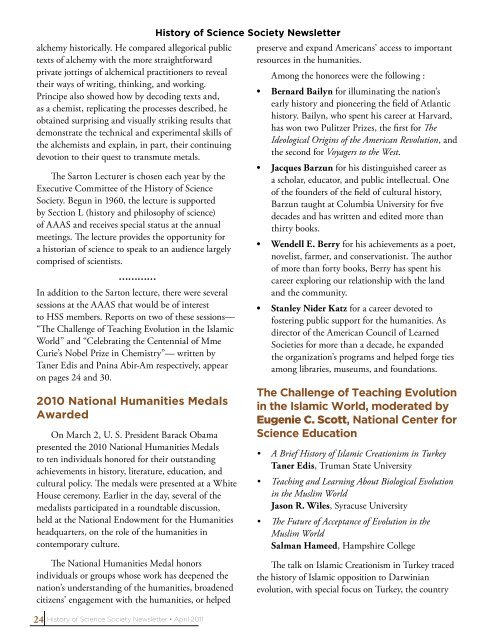Printer friendly version of Newsletter - History of Science Society
Printer friendly version of Newsletter - History of Science Society
Printer friendly version of Newsletter - History of Science Society
You also want an ePaper? Increase the reach of your titles
YUMPU automatically turns print PDFs into web optimized ePapers that Google loves.
alchemy historically. He compared allegorical public<br />
texts <strong>of</strong> alchemy with the more straightforward<br />
private jottings <strong>of</strong> alchemical practitioners to reveal<br />
their ways <strong>of</strong> writing, thinking, and working.<br />
Principe also showed how by decoding texts and,<br />
as a chemist, replicating the processes described, he<br />
obtained surprising and visually striking results that<br />
demonstrate the technical and experimental skills <strong>of</strong><br />
the alchemists and explain, in part, their continuing<br />
devotion to their quest to transmute metals.<br />
The Sarton Lecturer is chosen each year by the<br />
Executive Committee <strong>of</strong> the <strong>History</strong> <strong>of</strong> <strong>Science</strong><br />
<strong>Society</strong>. Begun in 1960, the lecture is supported<br />
by Section L (history and philosophy <strong>of</strong> science)<br />
<strong>of</strong> AAAS and receives special status at the annual<br />
meetings. The lecture provides the opportunity for<br />
a historian <strong>of</strong> science to speak to an audience largely<br />
comprised <strong>of</strong> scientists.<br />
…………<br />
In addition to the Sarton lecture, there were several<br />
sessions at the AAAS that would be <strong>of</strong> interest<br />
to HSS members. Reports on two <strong>of</strong> these sessions—<br />
“The Challenge <strong>of</strong> Teaching Evolution in the Islamic<br />
World” and “Celebrating the Centennial <strong>of</strong> Mme<br />
Curie’s Nobel Prize in Chemistry”— written by<br />
Taner Edis and Pnina Abir-Am respectively, appear<br />
on pages 24 and 30.<br />
2010 National Humanities Medals<br />
Awarded<br />
On March 2, U. S. President Barack Obama<br />
presented the 2010 National Humanities Medals<br />
to ten individuals honored for their outstanding<br />
achievements in history, literature, education, and<br />
cultural policy. The medals were presented at a White<br />
House ceremony. Earlier in the day, several <strong>of</strong> the<br />
medalists participated in a roundtable discussion,<br />
held at the National Endowment for the Humanities<br />
headquarters, on the role <strong>of</strong> the humanities in<br />
contemporary culture.<br />
<strong>History</strong> <strong>of</strong> <strong>Science</strong> <strong>Society</strong> <strong>Newsletter</strong><br />
preserve and expand Americans’ access to important<br />
resources in the humanities.<br />
Among the honorees were the following :<br />
• Bernard Bailyn for illuminating the nation’s<br />
early history and pioneering the field <strong>of</strong> Atlantic<br />
history. Bailyn, who spent his career at Harvard,<br />
has won two Pulitzer Prizes, the first for The<br />
Ideological Origins <strong>of</strong> the American Revolution, and<br />
the second for Voyagers to the West.<br />
• Jacques Barzun for his distinguished career as<br />
a scholar, educator, and public intellectual. One<br />
<strong>of</strong> the founders <strong>of</strong> the field <strong>of</strong> cultural history,<br />
Barzun taught at Columbia University for five<br />
decades and has written and edited more than<br />
thirty books.<br />
• Wendell E. Berry for his achievements as a poet,<br />
novelist, farmer, and conservationist. The author<br />
<strong>of</strong> more than forty books, Berry has spent his<br />
career exploring our relationship with the land<br />
and the community.<br />
• Stanley Nider Katz for a career devoted to<br />
fostering public support for the humanities. As<br />
director <strong>of</strong> the American Council <strong>of</strong> Learned<br />
Societies for more than a decade, he expanded<br />
the organization’s programs and helped forge ties<br />
among libraries, museums, and foundations.<br />
The Challenge <strong>of</strong> Teaching Evolution<br />
in the Islamic World, moderated by<br />
Eugenie C. Scott, National Center for<br />
<strong>Science</strong> Education<br />
• A Brief <strong>History</strong> <strong>of</strong> Islamic Creationism in Turkey<br />
Taner Edis, Truman State University<br />
• Teaching and Learning About Biological Evolution<br />
in the Muslim World<br />
Jason R. Wiles, Syracuse University<br />
• The Future <strong>of</strong> Acceptance <strong>of</strong> Evolution in the<br />
Muslim World<br />
Salman Hameed, Hampshire College<br />
The National Humanities Medal honors<br />
individuals or groups whose work has deepened the<br />
nation’s understanding <strong>of</strong> the humanities, broadened<br />
citizens’ engagement with the humanities, or helped<br />
The talk on Islamic Creationism in Turkey traced<br />
the history <strong>of</strong> Islamic opposition to Darwinian<br />
evolution, with special focus on Turkey, the country<br />
24 <strong>History</strong> <strong>of</strong> <strong>Science</strong> <strong>Society</strong> <strong>Newsletter</strong> • April 2011
















